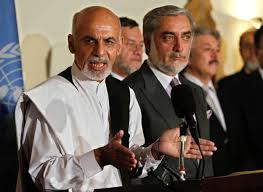ID :
342259
Tue, 09/23/2014 - 13:48
Auther :
Shortlink :
https://oananews.org//node/342259
The shortlink copeid
Daily Comments On Afghanistan’s Tough Democracy Exercise

Tehran, Sept 23, IRNA - 'Iran Daily' on Tuesday commenting on Afghanistan's presidential elections said that the success of the process of state-nation building, adaptation to political-social tradition and modern requirements will undoubtedly help develop a stable Afghanistan.
Such situation will be in favor of the Afghan people as well as regional countries, added the English-language paper in its Opinion column (pg 3).
Six months after the disputed presidential election in Afghanistan, rival presidential candidates reached an agreement on a power-sharing deal to form a national unity government. The impasse between Ashraf Ghani and Abdullah Abdullah since the June 14 election plunged Afghanistan into a crisis with both candidates claiming victory amid allegations of massive fraud, noted the daily.
When the Afghans went to the polling stations, they did not expect the name of the new president to be declared through concession and intervention of foreign states, particularly the US, highlighted the daily.
In such a situation, it was possible that the results of the election would lead to a war and the formation of parallel governments. So this agreement was the best choice for both sides to the dispute, it wrote.
With the formation of national unity government, both rivals will have the same share of the power and it seems that the political future will not face a serious challenge. But the main problem of the national unity government is the lack of legality of such an administration. The unity government may face serious challenges in the future since it has not received its legitimacy through the votes of the people but from a practical initiative imposed on the Afghans by the US, wrote the daily.
The question is the means through which the legitimacy of power is gained in Afghanistan and whether the Afghan people will participate in the next presidential election en masse again, reflected the paper, expressing its belief that the answers to these questions could be sought from the traditional and modern elements that form the power bases in Afghanistan.
However, adaptation to the traditional and modern bodies is not a simple task and this always prepares the ground for foreign intervention.
Afghanistan is trapped between traditional and modern bodies. On the one hand, Loya Jirga — an assembly of around 2,500 Afghan elders and notables — is an old traditional body that gives legitimacy to power in the country and on the other hand the Afghans want to have democracy and election.
The power-sharing agreement was signed in the presence of outgoing President Hamid Karzai, jihadi forces and other top figures of Afghanistan, so the possibility of a war and a serious tension in the near future is very slim. But, this election was a good opportunity which unfortunately the Afghans missed.The fact is that the best choice for the Afghans is to accept the votes of the people and peaceful transition of power from the Pashtuns to the Tajiks. Such a process will reduce ethnic tensions, suggested the daily. In the election, we witnessed changing communal affiliations with some people in Pashtun-dominated regions voting in favor of Abdullah, who is a Tajik, and some people in Tajik-dominated regions voting for Ghani, a Pashtun.
Unfortunately, the Afghans missed a golden opportunity for state-nation building process. Of course the new agreement will help restore peace and stability in the country and create another opportunity for Afghans.





